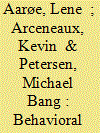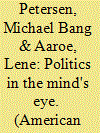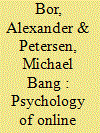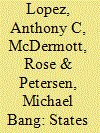|
|
|
Sort Order |
|
|
|
Items / Page
|
|
|
|
|
|
|
| Srl | Item |
| 1 |
ID:
153780


|
|
|
|
|
| Summary/Abstract |
We present, test, and extend a theoretical framework that connects disgust, a powerful basic human emotion, to political attitudes through psychological mechanisms designed to protect humans from disease. These mechanisms work outside of conscious awareness, and in modern environments, they can motivate individuals to avoid intergroup contact by opposing immigration. We report a meta-analysis of previous tests in the psychological sciences and conduct, for the first time, a series of tests in nationally representative samples collected in the United States and Denmark that integrate the role of disgust and the behavioral immune system into established models of emotional processing and political attitude formation. In doing so, we offer an explanation for why peaceful integration and interaction between ethnic majority and minorities is so hard to achieve.
|
|
|
|
|
|
|
|
|
|
|
|
|
|
|
|
| 2 |
ID:
177188


|
|
|
|
|
| Summary/Abstract |
Widespread distrust in politicians is often attributed to the way elites portray politics to citizens: the media, competing candidates, and foreign governments are largely considered responsible for portraying politicians as self-interested actors pursuing personal electoral and economic interests. This article turns to the mass level and considers the active role of citizens in disseminating such information. We build on psychological research on human cooperation, holding that people exhibit an interpersonal transmission bias in favor of information on the self-interested, antisocial behavior of others to maintain group cooperation. We posit that this transmission bias extends to politics, causing citizens to disproportionally disseminate information on self-interested politicians through interpersonal communication and, in turn, contributes to distrust in politicians and policy disapproval. We support these predictions using novel experimental studies, allowing us to observe transmission rates and opinion effects in actual communication chains. The findings have implications for understanding and accommodating political distrust.
|
|
|
|
|
|
|
|
|
|
|
|
|
|
|
|
| 3 |
ID:
121122


|
|
|
|
|
| Publication |
2013.
|
| Summary/Abstract |
How do modern individuals form a sense of the vast societies in which they live? Social cognition has evolved to make sense of small, intimate social groups, but in complex mass societies, comparable vivid social cues are scarcer. Extant research on political attitudes and behavior has emphasized media and interpersonal networks as key sources of cues. Extending a classical argument, we provide evidence for the importance of an alternative and internal source: imagination. With a focus on social welfare, we collected survey data from two very different democracies, the United States and Denmark, and conducted several studies using explicit, implicit, and behavioral measures. By analyzing the effects of individual differences in imagination, we demonstrate that political cognition relies on vivid, mental simulations that engage evolved social and emotional decision-making mechanisms. It is in the mind's eye that vividness and engagement are added to people's sense of mass politics.
|
|
|
|
|
|
|
|
|
|
|
|
|
|
|
|
| 4 |
ID:
184289


|
|
|
|
|
| Summary/Abstract |
Why are online discussions about politics more hostile than offline discussions? A popular answer argues that human psychology is tailored for face-to-face interaction and people’s behavior therefore changes for the worse in impersonal online discussions. We provide a theoretical formalization and empirical test of this explanation: the mismatch hypothesis. We argue that mismatches between human psychology and novel features of online environments could (a) change people’s behavior, (b) create adverse selection effects, and (c) bias people’s perceptions. Across eight studies, leveraging cross-national surveys and behavioral experiments (total N = 8,434), we test the mismatch hypothesis but only find evidence for limited selection effects. Instead, hostile political discussions are the result of status-driven individuals who are drawn to politics and are equally hostile both online and offline. Finally, we offer initial evidence that online discussions feel more hostile, in part, because the behavior of such individuals is more visible online than offline.
|
|
|
|
|
|
|
|
|
|
|
|
|
|
|
|
| 5 |
ID:
107649


|
|
|
|
|
| Publication |
2011.
|
| Summary/Abstract |
The use of evolutionary models to examine political behavior in international relations has been the subject of much debate, but serious scholarly work has generally been lacking, in part because the causal mechanisms have not always been clearly explicated. An evolutionary psychological framework can correct this deficit and benefit research in at least three major areas of international relations: (1) how political groups such as states are perceived and represented by individuals and groups; (2) how coalitional action is facilitated among states; and (3) sex differences in coalitional behavior. Hypotheses are offered in each of these areas to more clearly demonstrate the psychological mechanisms that are the bridge between evolutionary theory and political behavior in the international system. The social and political landscape of the ancestral environments in which humans evolved strongly suggests that the psychological architecture of humans possesses specialized design for coalitional living that continues to guide behavior in the modern political world. These evolved mechanisms structure human motivation and engagement in areas including leadership and war.
|
|
|
|
|
|
|
|
|
|
|
|
|
|
|
|
|
|
|
|
|